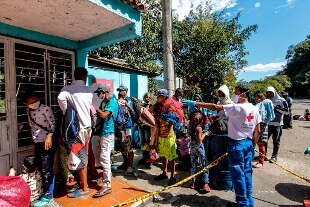Share
05 March 2021 In the midst of the pandemic, Colombian President Ivan Duque, after meeting with the UN High Commissioner, Filippo Grandi, announces the regularization of about 2 million Venezuelan refugees and migrants who have been fleeing their country for more than seven years.
The new temporary protection statute is valid for 10 years and aims to integrate this large mass of exiles in work, education, health and also in anti-Covid vaccination - 19. Duque wants to give a humanitarian and social change to the tragedy of Venezuelans who flee from violence, insecurity, persecution, in search of food and a better future, facing courageously, in the face of the deafening silence of the "powerful", the problem of the Caribbean country that has seen more than five flee to date millions of Venezuelans.
Although the Colombian situation is going through one of its most difficult moments, both from an economic and a political point of view, not to mention the pandemic problem that is knocking out Latin American countries, this challenge represents a decision that undoubtedly has a human face. proper to political charity, however complex to implement and expensive, for a country that does not have the standards of rich countries.
"To do so not a very rich and super-developed country - declared Pope Francis - but a country with many problems of development, poverty, peace and almost 70 years of guerrilla warfare. Despite the many problems to face, it had the courage look at these migrants and make this Statute. Thank you to Colombia! Thank you! ".
António Guterres, UN secretary general also declared that "This important act of solidarity will allow at least one third of the five million refugees and migrants in the region to formally access services and contribute to the Colombian economy".
Finally, Filippo Grandi of UNHCR, who accompanied Duke during the announcement at the Casa di Nariño, called it "the most important humanitarian gesture ever made on the continent since the 1984 Cartagena Refugee Declaration".
Beyond the ideological and political discussions, Colombia takes a first step in the name of "brotherhood", reaching out to people who demand respect for human rights to face a serious problem that affects, in the first place, life of the elderly, children, pregnant women and people with disabilities, and which in any case requires the financial support of the entire international community.

